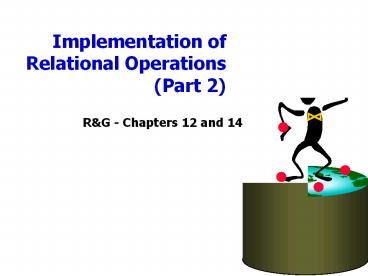Implementation of Relational Operations (Part 2) - PowerPoint PPT Presentation
1 / 19
Title:
Implementation of Relational Operations (Part 2)
Description:
Title: Implementation of Relational Operators (Joins) Subject: Database Management Systems Author: Raghu Ramakrishnan Keywords: Module 4, Lecture 1 – PowerPoint PPT presentation
Number of Views:112
Avg rating:3.0/5.0
Title: Implementation of Relational Operations (Part 2)
1
Implementation of Relational Operations(Part 2)
- RG - Chapters 12 and 14
2
An Alternative to Sorting Hashing!
- Idea
- Many of the things we use sort for dont exploit
the order of the sorted data - e.g. removing duplicates in DISTINCT
- e.g. finding matches in JOIN
- Often good enough to match all tuples with equal
values - Hashing does this!
- And may be cheaper than sorting! (Hmmm!)
- But how to do it for data sets bigger than
memory??
3
General Idea
- Two phases
- Partition use a hash function h to split tuples
into partitions on disk. - Key property all matches live in the same
partition. - ReHash for each partition on disk, build a
main-memory hash table using a hash function h2
4
Two Phases
- Partition
- Rehash
Result
Partitions
Hash table for partition Ri (lt B pages)
hash
fn
h2
B main memory buffers
Disk
5
Duplicate Elimination using Hashing
Result
Partitions
Hash table for partition Ri (lt B pages)
- read one bucket at a time
- for each group of identical tuples, output one
hash
fn
h2
B main memory buffers
Disk
6
Cost of External Hashing
cost 4R IOs
7
Memory Requirement
- How big of a table can we hash in two passes?
- B-1 partitions result from Phase 0
- Each should be no more than B pages in size
- Answer B(B-1).
- Said differently
- We can hash a table of size N pages in about
space - Note assumes hash function distributes records
evenly! - Have a bigger table? Recursive partitioning!
8
How does this compare with external sorting?
9
Cost of External
Hashing
Sorting
cost 4R IOs
10
Cost of External
Sorting
cost 4R IOs
11
Memory Requirement for External Sorting
- How big of a table can we sort in two passes?
- Each sorted run after Phase 0 is of size B
- Can merge up to B-1 sorted runs in Phase 1
- Answer B(B-1).
- Said differently
- We can sort a table of size N pages in about
space - Have a bigger table? Additional merge passes!
12
So which is better ??
- Based on our simple analysis
- Same memory requirement for 2 passes
- Same IO cost
- Digging deeper
- Sorting pros
- Great if input already sorted (or almost sorted)
- Great if need output to be sorted anyway
- Not sensitive to data skew or bad hash
functions - Hashing pros
- Highly parallelizable (will discuss later in
semester) - So is sorting, with some work
- Can exploit extra memory to reduce IOs (stay
tuned)
13
Q Can we use hashing for JOIN ?
before we optimize hashing further
14
Hash Join
15
Cost of Hash Join
- Partitioning phase readwrite both relations
- ? 2(RS) I/Os
- Matching phase read both relations, write output
- ? RS output I/Os
- Total cost of 2-pass hash join
3(RS)output
Q what is cost of 2-pass sort join?
Q how much memory needed for 2-pass sort join?
Q how much memory needed for 2-pass hash join?
16
An important optimization to hashing
- Have B memory buffers
- Want to hash relation of size N
passes
2
1
N
B2
B
If B lt N lt B2, will have unused memory
17
Hybrid Hashing
- Idea keep one of the hash buckets in memory!
Original Relation
k-buffer hashtable
Partitions
OUTPUT
2
2
1
3
h3
3
INPUT
. . .
h
B-k
B-k
B main memory buffers
Disk
Disk
Q how do we choose the value of k?
18
Cost reduction due to hybrid hashing
- Now
passes
cost
2
3N
1
N
N
B
B2
19
Summary Hashing vs. Sorting
- Sorting pros
- Good if input already sorted, or need output
sorted - Not sensitive to data skew or bad hash functions
- Hashing pros
- Often cheaper due to hybrid hashing
- For join passes depends on size of smaller
relation - Highly parallelizable































